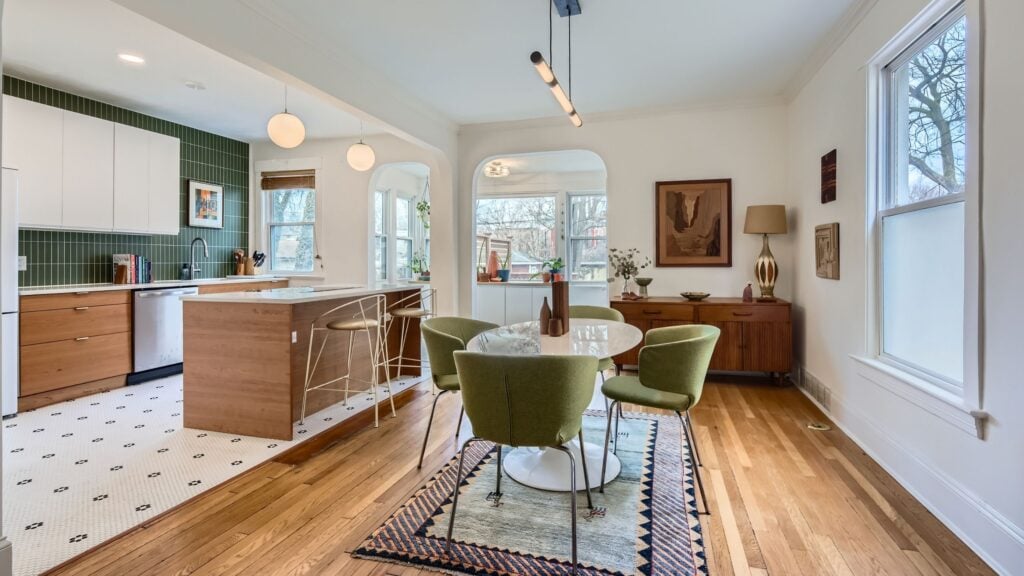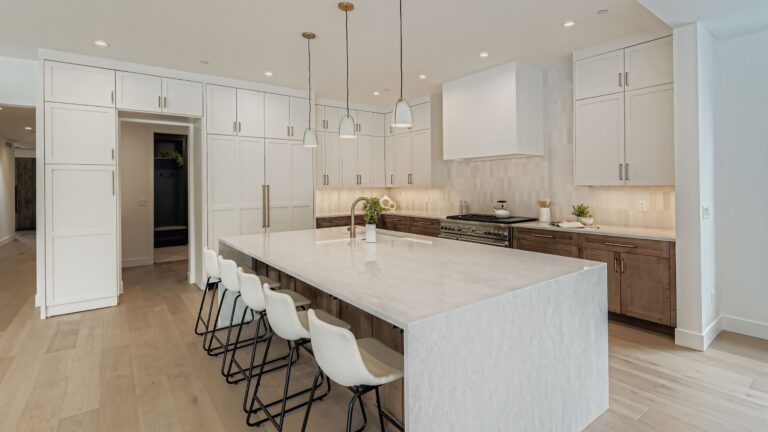If you’re a real estate agent in Chicago, Illinois, you know more than anyone that property taxes can make or break a sale. Chicago’s property taxes are some of the highest rates in the nation, and it’s essential to consider them before buying or selling a home.
Whether you’re looking to buy or sell, generate more leads, represent clients in the Windy City, or are just curious, we have the information you need to know about Chicago property tax.
Property tax rates in Chicago for 2025
Chicago is filled with culture, from legendary hot dogs and pizza to stunning architecture. The Cloud Gate Sculpture in Millenium Park is a popular picture spot with its reflective surface and bean shape. Chicago values the arts and education, with 68 museums throughout the city. Sports fans will instantly know Wrigley Field, operating since 1914 and still going strong nearly 100 years later.
With its cultural significance and high tourism rate, it isn’t surprising that Chicago, and much of Illinois, has some of the highest property taxes in the United States. In fact, Illinois ranks second for the highest property taxes.
What are Chicago’s property tax rates?
Property tax rates for single-family homes in Chicago differ based on location. While the city-wide average is approximately 7.002%, your actual tax rate will depend on the specific neighborhood or taxing district where your property is located.
The following taxing districts that fall within Chicago’s boundaries, show the following tax rates:
- West Chicago: 6.995%
- North Chicago: 6.995%
- South Chicago: 6.995%
- Rogers Park: 6.995%
- Lake View Township: 6.995%
- Jefferson Township: 6.999%
- Hyde Park: 7.012%
- Lake Township: 7.033%
The best way to determine your Chicago, Illinois, property tax rate is by visiting the Cook County Treasurer’s website. It offers a property tax overview by entering your property PIN number or address, giving you exact rates for your home and location.
To see if you qualify for a homestead, senior, disability, or other property tax exemption, contact the Cook County Assessor’s Office. The Assessor’s Office also offices a FAQ page to address specific questions about your property tax amount.
If you believe an error was made in calculating your property taxes, you must contact the Cook County Board of Review and fill out the online form.
Cook County’s property value assessment cycle
In Cook County, property values are officially reviewed and updated by the Assessor’s Office every three years. This process doesn’t happen all at once across the entire county. Instead, the Assessor’s Office staggers these updates, focusing on different areas in a three-year rotation.
One year they’ll reassess properties in the north and west suburbs, the next year it’s the south and west suburbs, and in the third year, they’ll update property values within the City of Chicago. This cyclical approach ensures that all areas of Cook County are reassessed within a three-year timeframe.
The Chicago property tax process
Cook County’s property taxes involve these key steps to determine property taxes in the Chicago area:
- Assessment: The Cook County Assessor estimates property market value, then applies different percentages (10% of fair cash value for residential, 25% for commercial) to determine the assessed value.
- Appeals: Property owners can challenge assessments with the Assessor and the Board of Review.
- Equalization: The Illinois Department of Revenue uses a multiplier based on an assessment/sales ratio study. This adjusts local property assessments to reach a uniform level of 33.33% of fair cash value. This equalization process is enforced by the state to guarantee that the property tax burden is shared equally among all property owners across Illinois.
- Levy: Local governments (schools, cities, etc.) set the amount of property taxes they need (the levy). The number of levies set is what helps determine if tax rates need to increase or decrease.
- Rate Calculation: The Cook County Clerk divides each district’s levy by its total equalized assessed value to get the tax rate.
- Tax Bill: The Clerk multiplies your property’s equalized assessed value by the combined tax rates of all applicable districts to determine your tax bill.
- Collection & Enforcement: The Cook County Treasurer collects payments and handles penalties for unpaid taxes, including potential tax sales.
In essence: Your tax bill is based on a portion of your property’s estimated value, adjusted to ensure fairness across the state, and then multiplied by the rates set by your local governments to fund their services.
Will property tax rates rise in 2025?
Contrary to initial proposals, Chicago property owners will not see a general increase in property tax rates in 2025. While Mayor Brandon Johnson’s early budget discussions included a significant property tax hike, the final budget approved by the City Council opted for alternative revenue streams. These include increases in taxes and fees on personal property leases (like cloud computing), checkout bags, streaming services, ride-sharing, and parking.
Instead of a broad property tax increase, Chicago’s 2025 budget implements several other tax and fee adjustments. Residents and businesses should be aware of higher costs associated with streaming, parking, and even checkout bags. While the average property tax rate remains stable, it’s crucial to remember that individual property tax bills can still vary based on location and reassessments.
That said, certain areas in Chicago are due for property reassessments, meaning if your home value increases, your property taxes will rise—even if the rate is unchanged.
Tax rates in surrounding areas
Chicago’s property tax rates are pricey, but so are many places in Illinois. If you want to live near Chicago without paying the price, consider another place near Chicago and Cook County. Here is a quick list of general averages in locations near Chicago:
- Algonquin: 5.65%
- Wheaton: 6.63%
- Aurora: 7.81%
- Naperville: 5.99%
- Rockford: 9%
While not an exhaustive list, potential buyers can see how wide property taxes range in Illinois.
What does property tax revenue fund in Chicago?
Local property taxes are assessed and collected by Cook County to fund services and programs in the area, including:
- Police departments
- Fire stations
- Street maintenance
- Libraries
- Public schools
- Metro stations
- Community health centers
Important information to know when moving to Chicago, IL
The cost of living in Chicago is significantly higher than both the Illinois and national averages. Specifically, it’s about 24% more expensive than the average across Illinois and around 14% more expensive than the national average. This places Chicago among the more expensive cities globally.
Despite the higher cost, its vibrant culture and numerous attractions draw approximately 50 million tourists annually. Remember that Chicago’s sales tax rate is a substantial 10.25%, which includes the Illinois base rate of 6.25%.
Property tax payment deadlines in Chicago can vary slightly each year, but typically fall around March/May for the first installment and October/December for the second. To ensure you have the most accurate due dates for your specific property taxes, it’s essential to regularly consult the official Cook County Treasurer’s website. Staying informed about these deadlines will help you manage your finances effectively and avoid any potential late fees.
Showcasing Chicago properties with a visual edge
As a real estate agent navigating the Chicago market, you understand the critical role property taxes play in every transaction. With rates being a significant consideration for both buyers and sellers, presenting a property in its best light is paramount. This is where high-quality real estate photography becomes an invaluable asset.
To truly capture the essence and appeal of your Chicago listings, professional photography can make all the difference. Virtuance offers top-tier real estate photography services and immersive solutions specifically designed to showcase properties in the Windy City. Our licensed and highly-certified photographers understand how to highlight the unique features and charm of Chicago homes and rentals, helping you attract more attention and generate greater interest, ultimately facilitating successful sales in this competitive market.
Ready to elevate your Chicago listings? Schedule a shoot with Virtuance today!
FAQ
Yes, Chicago and much of Illinois have some of the highest property taxes in the United States.
No, there will not be a general increase in Chicago property tax rates in 2025.
The Cook County Treasurer’s website provides property tax information by address or PIN.
Property values within the City of Chicago are reassessed every three years as part of Cook County’s cyclical process.
Local property taxes in Chicago fund essential services like police, fire departments, schools, and infrastructure.








